数据结构( Pyhon 语言描述 ) — —第9章:列表
- 概念
- 列表是一个线性的集合,允许用户在任意位置插入、删除、访问和替换元素
- 使用列表
- 基于索引的操作
- 基本操作
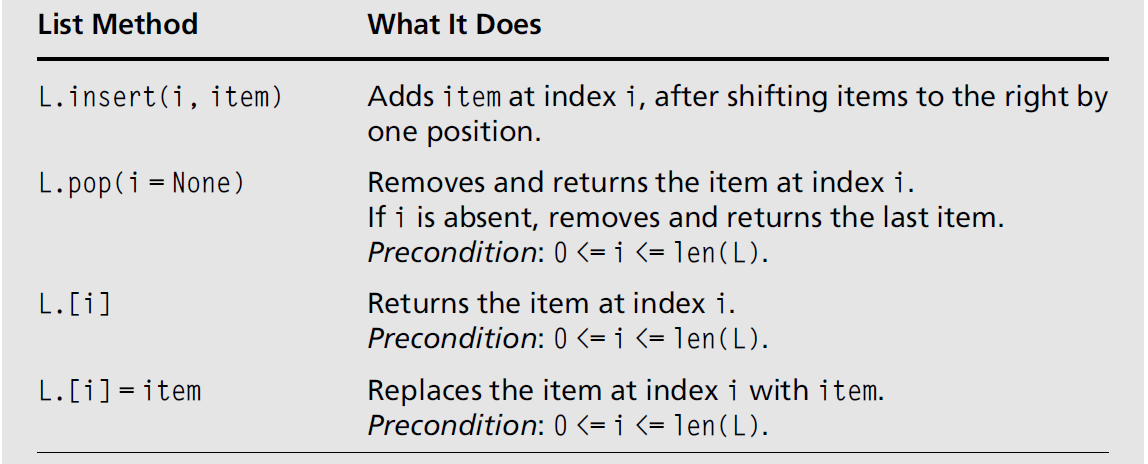
- 数组与列表的区别
- 数组是一种具体的数据结构,拥有基于单个的物理内存块的一种特定的,不变的实现。
- 列表是一种抽象的数据类型,可以由各种方式表示,数组只是其中一种方式
- 基于内容的操作
- 基本操作

- 基于位置的操作
- 相对于游标位置执行,这个操作允许程序员在通过移动游标在列表中导航。其可通过列表迭代器来实现
- 列表迭代器是附加到列表的后备储存

- 列表迭代器游标的位置
- 第一项之前
- 相领两项之间
- 最后一项之后
- 列表迭代器第一次实例化的时候,其游标是未定义的
- 列表迭代器的方法
- 导航操作
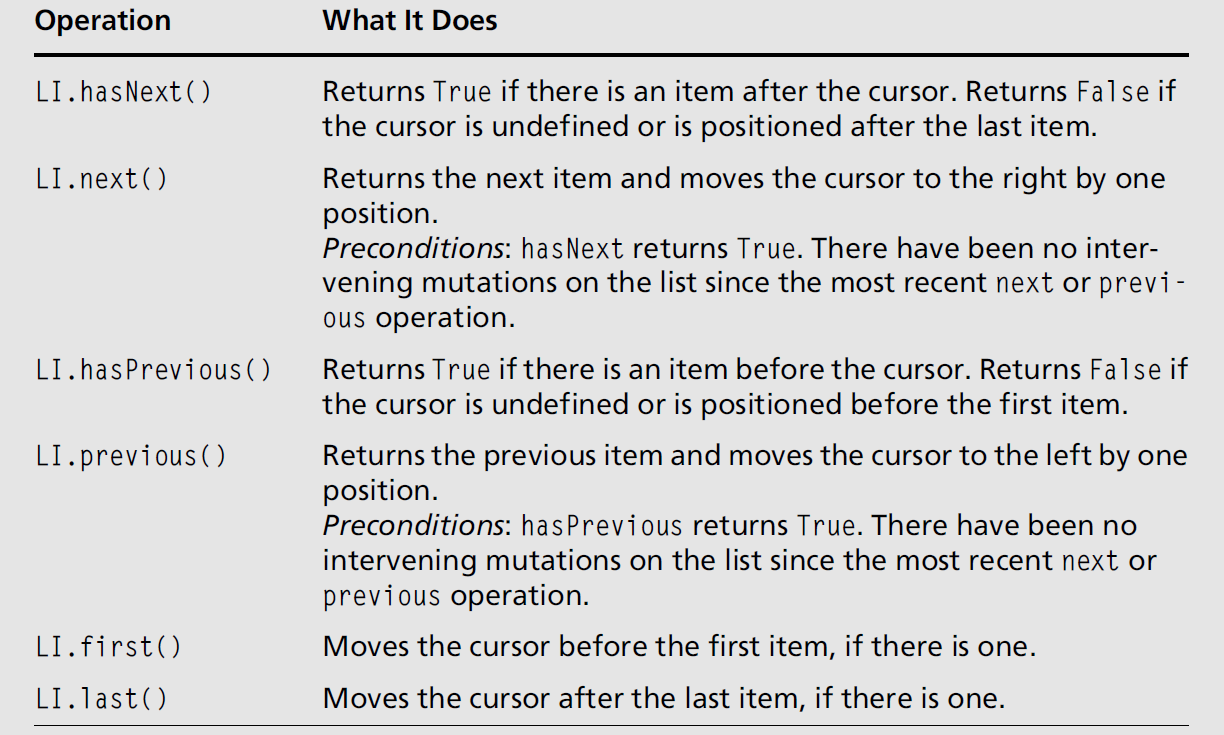
- 修改操作
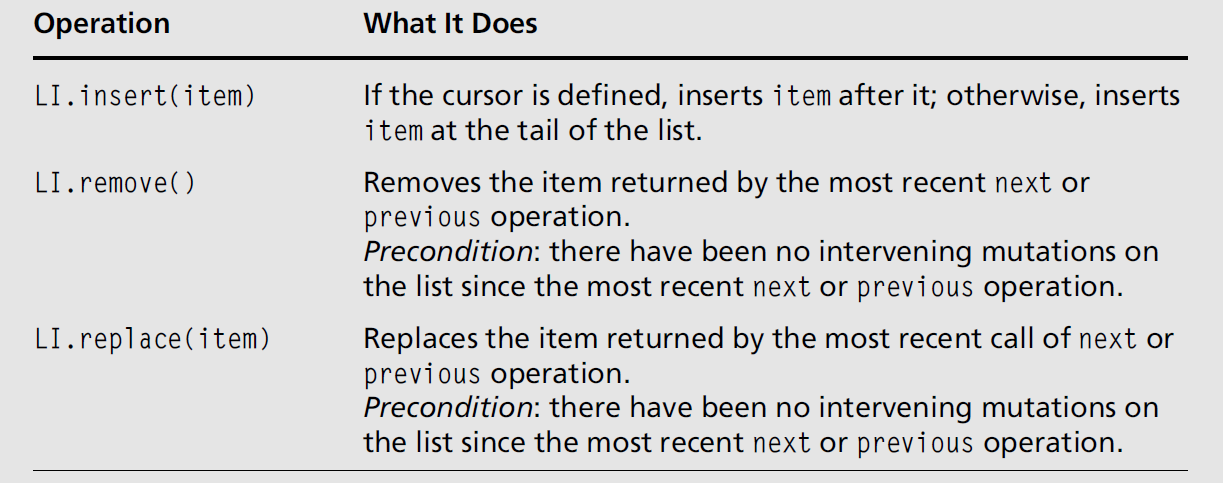
- remove 和 replace 操作均需要满足先验条件
- 列表的接口
- 基本列表操作概览
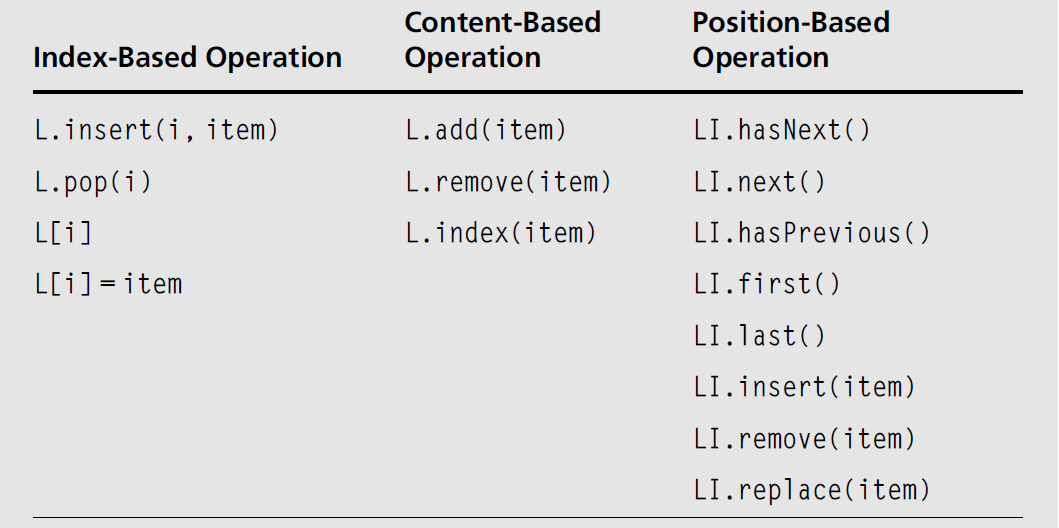
- 列表和列表迭代器的接口和实现类
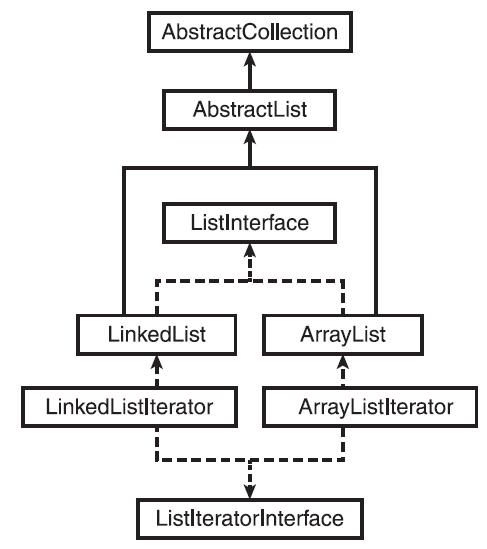
- 列表的应用
- 列表可能是计算机领域应用最为广泛的集合
- 堆存储管理
- 在一个可用的列表中,将堆上可用空间的连续块链接起来。当应用程序需要一个新的实例化对象时,PVM会在可用列表中搜索大小足够容纳对象的第一个块。当不再需要对象的时候,垃圾收集程序会把对象的空间返回给可用列表
- 为了减少搜索时间,可以使用多个可用列表,分别包含不同字节大小的块;最后一个列表应该包含比某个指定的大小还要大的所有的块。
- 组织磁盘上的文件
- 计算机文件系统有3个主要的部分:文件的目录、文件自身以及可用空间。
- 磁盘的物理格式
- 磁盘的表面被划分为多个同心圆磁道,每个磁道被进一步划分为扇区。所有磁道包含的扇区数相同,所有扇区包含的字节数也相同
- 示意图
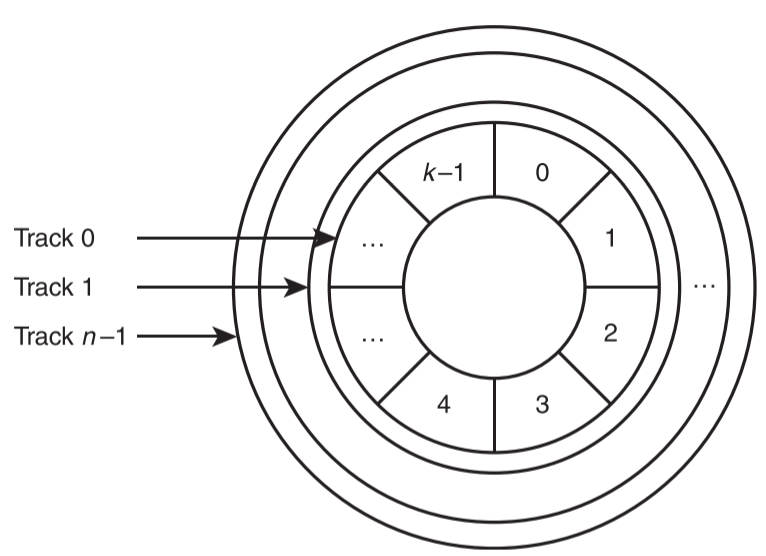
- 文件系统
- 假设目录占用了磁盘上的前几个磁道并且为每个文件包含了一个条目。这个条目包含文件的信息和扇区地址,这个扇区地址指向文件中的第 1 个字节
- 根据文件的大小,其可能完全包含在一个扇区,或者同时跨越几个扇区。
- 组成文件的扇区并不需要物理相邻,扇区的最后有一个指针,该指针指向了包含文件的下一个扇区
- 列表在文件系统中的应用
- 没有使用的扇区在一个可用列表中被链接起来。当创建新文件时,它们从这个列表中得到分配的空间,当删除旧文件时,它们的空间释放到这个列表中
- 磁盘读写步骤
- 读/写头定位到正确的磁道
- 磁盘转动,直到目标扇区在读写头下
- 进行数据读写
- 3个步骤中,数据读写所需要时间最少
- 性能优化
- 根据磁盘的特性,当跨多个扇区的文件,没有在磁盘上分散开时,磁盘的性能会得到优化
- 文件系统中包含一个工具,它会重新组织文件系统以便每个文件中的扇区都是连续的,并且具有相同的物理顺序和逻辑顺序。从而优化磁盘的性能。
- 其他集合的实现
- 列表可用来实现其它集合,通常有两种方法
- 扩展列表类,让新的类成为列表类的一个子类;
- 在新的类中,使用列表类的一个实例,并且让该列表包含数据项
- 列表实现
- AbstractList 类的角色
- 列表迭代器会使用 self._modCount 这个实例变量在某些方法上强制施加先验条件
- 代码实现
#!/usr/bin/env python
# -*- coding:utf-8 -*-
# Author:Lijunjie
from abstractcollection import AbstractCollection
class AbstractList(AbstractCollection):
"""An abstract list implementation."""
def __init__(self, sourceCollection):
"""Maintains a count of modifications to the left."""
self._modCount = 0
AbstractCollection.__init__(self, sourceCollection)
def getModCount(self):
"""Returns the count of modifications to the list."""
return self._modCount
def incModCount(self):
"""Increment the count of modifications."""
self._modCount += 1
def index(self, item):
"""Precondition: the item is in the list.
Return the position of the item.
Raise: ValueError if item isn't in the list"""
position = 0
for data in self:
if data == item:
return position
else:
position += 1
if position == len(self):
raise ValueError(str(item) + " not in list.")
def add(self, item):
"""Add the item to the end of the list."""
self.insert(len(self), item)
def remove(self, item):
"""Precondition: the item is in the list.
Raise: ValueError is item isn't in the list.
PostCondition:item is removed from self."""
position = self.index(item)
self.pop(position)
- 基于数组的实现
- ArrayList 有一个初始的默认大小,当需要时,其大小会自动变化
- 代码实现
#!/usr/bin/env python
# -*- coding:utf-8 -*-
# Author:Lijunjie
"""
File: ArrayList.py
"""
from arrays import Array
from abstractlist import AbstractList
from arraylistiterator import ArrayListIterator
class ArrayList(AbstractList):
"""An array-based list implementation."""
# Class variable
DEFAULT_CAPACITY = 10
def __init__(self, sourceCollection=None):
"""Sets the initial state of self, which includes the contents
of sourceCollection, if it's present."""
self._items = Array(ArrayList.DEFAULT_CAPACITY)
AbstractList.__init__(self, sourceCollection)
# Accessor method
def __iter__(self):
"""Support iteration over a view of self."""
cursor = 0
while cursor < len(self):
yield self._items[cursor]
cursor += 1
def __getitem__(self, i):
"""Precondition: 0<= i < len(self)
Return the item at position i.
Raises: IndexError"""
if i < 0 or i >= len(self):
raise IndexError("List out of range.")
return self._items[i]
# Mutator method
def __setitem__(self, i, item):
"""Precondition: 0 <= i < len(self)
Replace the item at position i.
Raise: IndexError"""
if i < 0 or i >= len(self):
raise IndexError("List out of range.")
self._items[i] = item
def insert(self, i, item):
"""Inserts item at the position i."""
# Resize the array if necessary
self._growArray()
# Set the position i between 0 and len(self)
if i < 0: i = 0
elif i > len(self): i = len(self)
if i < len(self):
for index in range(len(self), i, -1):
self._items[index] = self._items[index - 1]
self._items[i] = item
self._size += 1
self.incModCount()
def pop(self, i=None):
"""Precondition: 0 <= i < len(self).
Remove and return item at position i. if i is None, i is given a default of len(self) - 1"
Raise: Index Error."""
if i is None: i = len(self) - 1
if i < 0 or i >= len(self):
raise IndexError("List index out of range.")
item = self._items[i]
for index in range(i, len(self) - 1):
self._items[index] = self._items[index + 1]
self._items[len(self) - 1] = None
self._size -= 1
self.incModCount()
# Resize array in necessary
self._shrinkArray()
return item
def clear(self):
"""Clear the array list."""
self._items = Array(ArrayList.DEFAULT_CAPACITY)
self._size = 0
self.incModCount()
def listIterator(self):
"""Returns a list iterator."""
return ArrayListIterator(self)
def _growArray(self):
"""Grow the capacity of the array if necessary """
physicalSize = len(self._items)
if len(self) >= physicalSize:
temp = Array(physicalSize * 2)
index = 0
for item in self:
temp[index] = item
index += 1
self._items = temp
def _shrinkArray(self):
"""Shrink the capacity of the array if necessary. """
physicalSize = len(self._items)
if len(self) <= physicalSize // 4 and physicalSize >= 2 * ArrayList.DEFAULT_CAPACITY:
temp = Array(physicalSize // 2)
index = 0
for item in self:
temp[index] = item
index += 1
self._items = temp
- 链表实现
- 采用包含一个哨兵节点的双链表结构
- 示意图
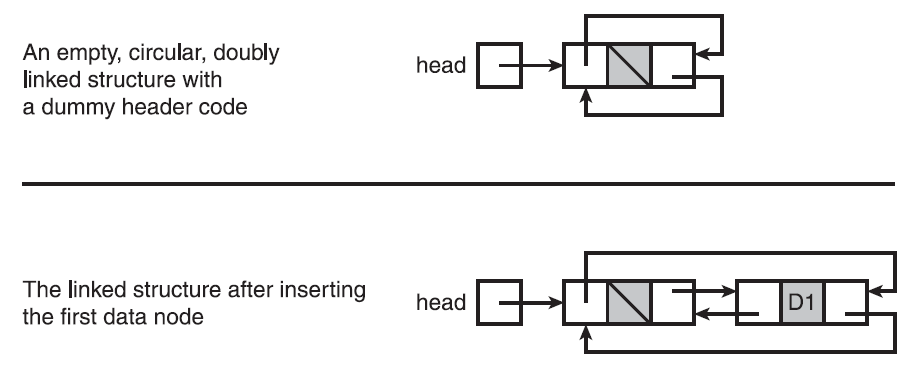
- 优点
- 不需要一个单独的尾指针
- 当插入或删除第一个或最后一个节点的时候,不需要重新设置头指针
- _getNode(i) 辅助方法用来搜索第 i 个节点
- 代码实现
#!/usr/bin/env python
# -*- coding:utf-8 -*-
# Author:Lijunjie
from node import TwoWayNode
from abstractlist import AbstractList
from linkedlistiterator import LinkedListIterator
class LinkedList(AbstractList):
"""A link-based list implementation"""
def __init__(self, sourceCollection=None):
"""Sets the initial state of self, which includes the contents
of sourceCollection, if it's present."""
self._head = TwoWayNode(None)
self._head.previous = self._head.next = self._head
AbstractList.__init__(self, sourceCollection)
# Helper method returns node at position i
def _getNode(self, i):
"""Helper method: returns a pointer to node at position i."""
if i == len(self): # Constant-time access to head node.
return self._head
if i == len(self) - 1: # or last data node
return self._head.previous
probe = self._head.next
while i > 0:
probe = probe.next
i -= 1
return probe
# Accessor method
def __iter__(self):
"""Support iteration over a view of self."""
cursor = self._head.next
while cursor != self._head:
yield cursor.data
cursor = cursor.next
def __getitem__(self, i):
"""Precondition: 0<= i < len(self)
Return the item at position i.
Raises: IndexError"""
if i < 0 or i >= len(self):
raise IndexError("List out of range.")
return self._getNode(i).data
def getHead(self):
return self._head
# Mutator method
def __setitem__(self, i, item):
"""Precondition: 0 <= i < len(self)
Replace the item at position i.
Raise: IndexError"""
if i < 0 or i >= len(self):
raise IndexError("List out of range.")
self._getNode(i).data = item
def insert(self, i, item):
"""Inserts item at the position i."""
# Set the position i between 0 and len(self)
if i < 0: i = 0
elif i > len(self): i = len(self)
theNode = self._getNode(i)
newNode = TwoWayNode(item, theNode.previous, theNode)
theNode.previous.next = newNode
theNode.previous = newNode
self._size += 1
self.incModCount()
def pop(self, i=None):
"""Precondition: 0 <= i < len(self).
Remove and return item at position i. if i is None, i is given a default of len(self) - 1"
Raise: Index Error."""
if i is None: i = len(self) - 1
if i < 0 or i >= len(self):
raise IndexError("List index out of range.")
theNode = self._getNode(i)
item = theNode.data
theNode.previous.next = theNode.next
theNode.next.previous = theNode.previous
self._size -= 1
self.incModCount()
return item
def clear(self):
"""Clear the linked list."""
self._head.previous = self._head.next = self._head
self._size = 0
self.incModCount()
def listIterator(self):
"""Returns a list iterator."""
return LinkedListIterator(self)
- 两种实现的时间和空间分析
- 列表操作的平均运行时间
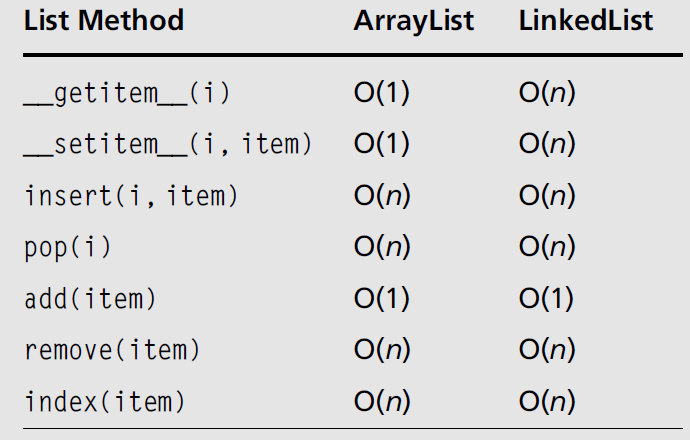
- 空间分析
- 当数组的装载因子大于 1/3 时,其空间效率要比列表高,否则要低
- 实现列表迭代器
- 列表迭代器的角色和作用
- 列表迭代器对象依赖于相关联的列表,因为前者需要访问后者以定位项、替换项、插入项和删除项
- 3种类型的先验条件
- 如果hasNext 或 hasPrevious 分别返回 False,程序员不能运行 next 或 previous 操作
- 不能在列表迭代器上运行连续性的修改器方法。在每次运行前,必须先运行一个 next 或 previous 以建立游标位置
- 使用实例变量 self._lastItemPos 来判断,当位置未确定时,其值为 -1。当程序在列表迭代器上成功运行一个next 或 previous 操作时,其值变成了列表中的一个索引。
- 列表迭代器中的修改器方法,通过检查 self._lastItemPos 以确保满足先验条件,并在成功修改列表后,将其重置为 -1
- 在列表上使用列表迭代器方法时,程序不能使用列表修改器方法在列表自身之上进行修改(如果修改会影响列表的游标位置,__setitem__方法不会影响)
- 通过比较列表的 modCount 和列表迭代器的 modCount 是否相同来判断
- 数组实现
- 代码
#!/usr/bin/env python
# -*- coding:utf-8 -*-
# Author:Lijunjie
"""
File:arraylistiterator.py
"""
class ArrayListIterator(object):
"""Represents the list iterator for an array list."""
def __init__(self, backingStore):
"""Set the initial state of the list iterator."""
self._backingStore = backingStore
self._modCount = backingStore.getModCount()
self._cursor = 0
self._lastItemPos = -1
self.first()
def first(self):
"""Resets the cursor to the beginning of the backing store."""
self._cursor = 0
self._lastItemPos = -1
def last(self):
"""Moves the cursor to the end of the backing store."""
self._cursor = len(self._backingStore)
self._lastItemPos = -1
def hasNext(self):
"""Return True if the iterator has a next item or False otherwise."""
return self._cursor < len(self._backingStore)
def next(self):
"""Precondition: hasNext returns True.The list has not been modified except by this iterator's mutator.
Returns the current item and advances the cursor to the next item."""
if not self.hasNext():
raise ValueError("No next item in list iterator.")
if self._modCount != self._backingStore.getModCount():
raise AttributeError("Illegal modification of backing store.")
self._lastItemPos = self._cursor
self._cursor += 1
return self._backingStore[self._lastItemPos]
def hasPrevious(self):
"""Return True if the iterator has a previous item or False otherwise"""
return self._cursor > 0
def previous(self):
"""Precondition: hasPrevious returns True. The list has not been modified except by this iterator's mutator.
"""
if not self.hasPrevious():
raise ValueError("No previous item in list iterator.")
if self._modCount != self._backingStore.getModCount():
raise AttributeError("Illegal modification of backing store.")
self._cursor -= 1
self._lastItemPos = self._cursor
return self._backingStore[self._lastItemPos]
def replace(self, item):
"""Precondition: the current position is defined. The list has not been modified except by this iterator's
mutator."""
if self._lastItemPos == -1:
raise AttributeError("The current position is undefined.")
if self._modCount != self._backingStore.getModCount():
raise AttributeError("Illegal modification of backing store.")
self._backingStore[self._lastItemPos] = item
self._lastItemPos = -1
def insert(self, item):
"""Precondition: The list has not been modified except by this iterator's mutator."""
if self._modCount != self._backingStore.getModCount():
raise AttributeError("Illegal modification of backing store.")
if self._lastItemPos == -1:
# Cursor not defined, so add item to end of list.
self._backingStore.add(item)
else:
self._backingStore.insert(self._lastItemPos, item)
# If the item insert was obtained via next, move cursor forward
if self._lastItemPos < self._cursor:
self._cursor += 1
self._lastItemPos = -1
self._modCount += 1
def remove(self):
"""Precondition: the current position is defined. The list has not been modified except by this iterator's
mutator."""
if self._lastItemPos == -1:
raise AttributeError("The current position is undefined.")
if self._modCount != self._backingStore.getModCount():
raise AttributeError("List has been modified illegally.")
self._backingStore.pop(self._lastItemPos)
# If the item removed was obtained via next, move cursor back
if self._lastItemPos < self._cursor:
self._cursor -= 1
self._modCount += 1
self._lastItemPos = -1
- 链表实现
- 用后备储存链表结构中的节点来表示游标,通过将游标设置为下一个节点或者前一个节点来实现导航性方法。这些会使得可能的修改操作都成为常数时间
- 代码
#!/usr/bin/env python
# -*- coding:utf-8 -*-
# Author:Lijunjie
"""
File:linkedlistiterator.py
"""
from node import TwoWayNode
class LinkedListIterator(object):
"""Represents the list iterator for an linked list."""
def __init__(self, backingStore):
"""Set the initial state of the list iterator."""
self._backingStore = backingStore
self._modCount = backingStore.getModCount()
self._head = backingStore.getHead()
self._cursor = self._head
self._lastItemPos = None
self.first()
def first(self):
"""Resets the cursor to the beginning of the backing store."""
self._cursor = self._head.next
self._lastItemPos = None
def last(self):
"""Moves the cursor to the end of the backing store."""
self._cursor = self._head.previous
self._lastItemPos = None
def hasNext(self):
"""Return True if the iterator has a next item or False otherwise."""
return self._cursor.next != self._head
def next(self):
"""Precondition: hasNext returns True.The list has not been modified except by this iterator's mutator.
Returns the current item and advances the cursor to the next item."""
if not self.hasNext():
raise ValueError("No next item in list iterator.")
if self._modCount != self._backingStore.getModCount():
raise AttributeError("Illegal modification of backing store.")
self._lastItemPos = self._cursor
self._cursor = self._cursor.next
return self._lastItemPos.data
def hasPrevious(self):
"""Return True if the iterator has a previous item or False otherwise"""
return self._cursor.previous != self._head
def previous(self):
"""Precondition: hasPrevious returns True. The list has not been modified except by this iterator's mutator.
"""
if not self.hasPrevious():
raise ValueError("No previous item in list iterator.")
if self._modCount != self._backingStore.getModCount():
raise AttributeError("Illegal modification of backing store.")
self._lastItemPos = self._cursor
self._cursor = self._cursor.previous
return self._lastItemPos.data
def replace(self, item):
"""Precondition: the current position is defined. The list has not been modified except by this iterator's
mutator."""
if self._lastItemPos is None:
raise AttributeError("The current position is undefined.")
if self._modCount != self._backingStore.getModCount():
raise AttributeError("Illegal modification of backing store.")
self._lastItemPos.data = item
self._lastItemPos = None
def insert(self, item):
"""Precondition: The list has not been modified except by this iterator's mutator."""
if self._modCount != self._backingStore.getModCount():
raise AttributeError("Illegal modification of backing store.")
if self._lastItemPos is None:
# Cursor not defined, so add item to end of list.
self._backingStore.add(item)
else:
newNode = TwoWayNode(item, self._lastItemPos.previous, self._lastItemPos)
self._lastItemPos.previous.next = newNode
self._lastItemPos.previous = newNode
self._backingStore.incModCount()
self._lastItemPos = None
self._modCount += 1
def remove(self):
"""Precondition: the current position is defined. The list has not been modified except by this iterator's
mutator."""
if self._lastItemPos is None:
raise AttributeError("The current position is undefined.")
if self._modCount != self._backingStore.getModCount():
raise AttributeError("List has been modified illegally.")
self._lastItemPos.previous.next = self._lastItemPos.next
self._lastItemPos.next.previous = self._lastItemPos.previous
self._backingStore.incModCount()
self._modCount += 1
self._lastItemPos = None
- 列表迭代器的时间和空间分析
- 链表实现,所有的运行方法都是O(1),数组实现的 insert 和 remove 方法都是 O(n)
- 开发一个有序的列表
- 分析
- 与常规列表的对比
- 不能使用 insert 和 __setitem__ 方法
- add 方法会在已有项之间,查找插入该项的一个合适的位置
- index 操作,会利用列表是有序的这一事实,针对给定项执行一次二叉搜索
- 设计
- 为了支持二叉搜索,因此选用基于数组实现的列表
- ArraySortedList 不能是 ArrayList 的一个子类,因为这样 ArraySortedList 会继承两个不能使用的方法
- 关系图
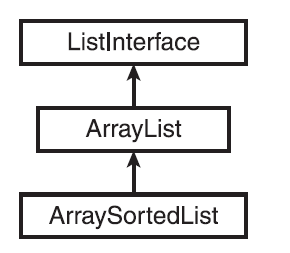
- 使用 ArrayList 的一个实例
- 使用 ArrayList 的一个实例来使 ArraySortedList 作为类的容器而子类化。但是如此并没有实现代码复用,ArrayList 中的每个方法,在 ArraySortedList 中都必须重新定义
- 实现策略
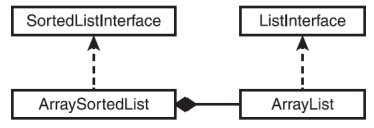
- 将 ArrayList 作为 ArraySortedList 的一个子类
- 列表实际上是带有两个额外方法( insert 和 __setitem__ )的有序列表,即列表接口是有序列表接口的一个扩展。
- 实现策略

- 列表方法分布
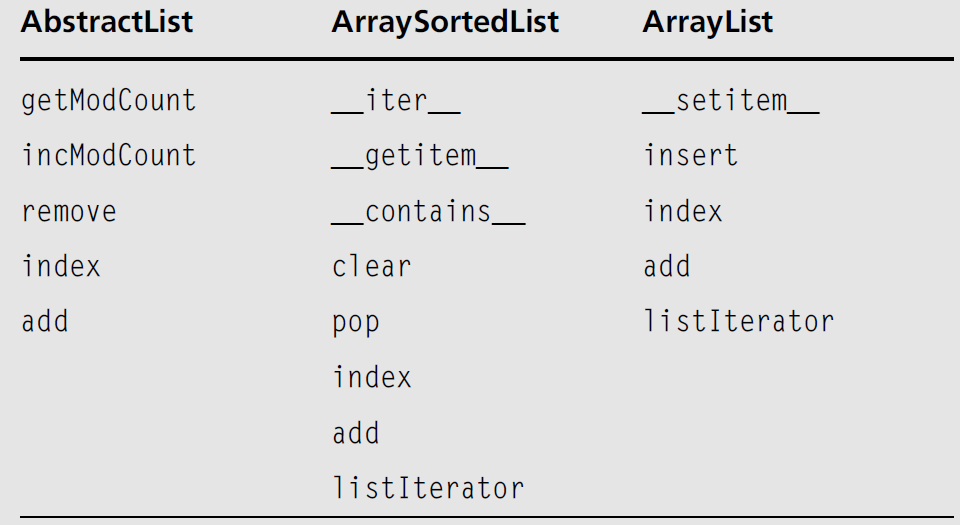
- ArrayList 中的 __contains__ 方法也需要重写
- 迭代器方法可以使用类似的方法实现
- ArraySortedListIterator 中包含了所有的导航方法以及 remove 方法。其子类 ArrayListIterator 中则只包含 insert 和 replace 方法
- 实现
- ArraySortedList
#!/usr/bin/env python
# -*- coding:utf-8 -*-
# Author:Lijunjie
"""
File: arraysortedlist.py
"""
from arrays import Array
from abstractlist import AbstractList
from arraysortedlistiterator import ArraySortedListIterator
class ArraySortedList(AbstractList):
"""An array-based sorted list implementation."""
# Class variable
DEFAULT_CAPACITY = 10
def __init__(self, sourceCollection=None):
"""Sets the initial state of self, which includes the contents
of sourceCollection, if it's present."""
self._items = Array(ArraySortedList.DEFAULT_CAPACITY)
AbstractList.__init__(self, sourceCollection)
# Accessor method
def __iter__(self):
"""Support iteration over a view of self."""
cursor = 0
while cursor < len(self):
yield self._items[cursor]
cursor += 1
def __getitem__(self, i):
"""Precondition: 0<= i < len(self)
Return the item at position i.
Raises: IndexError"""
if i < 0 or i >= len(self):
raise IndexError("List out of range.")
return self._items[i]
def __contains__(self, item):
position = self._binarySearch(item)
if self._items[position] == item:
return True
else:
return False
def _binarySearch(self, item):
"""Search item in the array sorted list."""
left = 0
right = len(self) - 1
mid = len(self)
while left <= right:
mid = (left + right) // 2
if self._items[mid] == item:
break
if self._items[mid] > item:
right = mid - 1
else:
left = mid + 1
return mid
def index(self, item):
"""Precondition: the item is in the list.
Return the position of the item.
Raise: ValueError if item isn't in the list"""
position = self._binarySearch(item)
if self._items[position] != item:
raise ValueError(str(item) + " isn't in the list.")
# find the first position if there is multiply items
for i in range(position - 1, -1, -1):
if self._items[i] != item:
return i + 1
# return the first place
return 0
# Mutator method
def pop(self, i=None):
"""Precondition: 0 <= i < len(self).
Remove and return item at position i. if i is None, i is given a default of len(self) - 1"
Raise: Index Error."""
if i is None: i = len(self) - 1
if i < 0 or i >= len(self):
raise IndexError("List index out of range.")
item = self._items[i]
for index in range(i, len(self) - 1):
self._items[index] = self._items[index + 1]
self._items[len(self) - 1] = None
self._size -= 1
self.incModCount()
# Resize array in necessary
self._shrinkArray()
return item
def add(self, item):
"""Add the item to the proper position of the list."""
# Resize the array if necessary.
self._growArray()
# Find the position by binary search
position = self._binarySearch(item)
flag = True
if position < len(self) and self._items[position] != item:
if item > self._items[position]:
for i in range(position + 1, len(self)):
if item <= self._items[i]:
position = i
flag = False
break
if flag:
position = len(self)
else:
for i in range(position - 1, -1, -1):
if item >= self._items[i]:
position = i + 1
flag = False
break
if flag:
position = 0
# Insert item at the proper position.
if position < len(self):
for index in range(len(self), position, -1):
self._items[index] = self._items[index - 1]
self._items[position] = item
self._size += 1
self.incModCount()
def clear(self):
"""Clear the array list."""
self._items = Array(ArraySortedList.DEFAULT_CAPACITY)
self._size = 0
self.incModCount()
def listIterator(self):
"""Returns a list iterator."""
return ArraySortedListIterator(self)
def _growArray(self):
"""Grow the capacity of the array if necessary """
physicalSize = len(self._items)
if len(self) >= physicalSize:
temp = Array(physicalSize * 2)
index = 0
for item in self:
temp[index] = item
index += 1
self._items = temp
def _shrinkArray(self):
"""Shrink the capacity of the array if necessary. """
physicalSize = len(self._items)
if len(self) <= physicalSize // 4 and physicalSize >= 2 * ArraySortedList.DEFAULT_CAPACITY:
temp = Array(physicalSize // 2)
index = 0
for item in self:
temp[index] = item
index += 1
self._items = temp
- ArrayList
#!/usr/bin/env python
# -*- coding:utf-8 -*-
# Author:Lijunjie
"""
File: ArrayList.py
"""
from abstractlist import AbstractList
from arraysortedlist import ArraySortedList
from arraylistiterator import ArrayListIterator
class ArrayList(ArraySortedList):
"""An array-based list implementation."""
def __init__(self, sourceCollection=None):
"""Sets the initial state of self, which includes the contents
of sourceCollection, if it's present."""
ArraySortedList.__init__(self, sourceCollection)
# Accessor method
def index(self, item):
"""Precondition: the item is in the list.
Return the position of the item.
Raise: ValueError if item isn't in the list"""
AbstractList.index(self, item)
def __contains__(self, item):
for i in self:
if i == item:
return True
return False
# Mutator method
def __setitem__(self, i, item):
"""Precondition: 0 <= i < len(self)
Replace the item at position i.
Raise: IndexError"""
if i < 0 or i >= len(self):
raise IndexError("List out of range.")
self._items[i] = item
def insert(self, i, item):
"""Inserts item at the position i."""
# Resize the array if necessary
self._growArray()
# Set the position i between 0 and len(self)
if i < 0: i = 0
elif i > len(self): i = len(self)
if i < len(self):
for index in range(len(self), i, -1):
self._items[index] = self._items[index - 1]
self._items[i] = item
self._size += 1
self.incModCount()
def add(self, item):
"""Add the item to the end of the list."""
AbstractList.add(self, item)
def listIterator(self):
"""Returns a list iterator."""
return ArrayListIterator(self)
- ArraySortedListIterator
#!/usr/bin/env python
# -*- coding:utf-8 -*-
# Author:Lijunjie
"""
File:arraysortedlistiterator.py
"""
class ArraySortedListIterator(object):
"""Represents the list iterator for a sorted array list."""
def __init__(self, backingStore):
"""Set the initial state of the list iterator."""
self._backingStore = backingStore
self._modCount = backingStore.getModCount()
self._cursor = 0
self._lastItemPos = -1
self.first()
def first(self):
"""Resets the cursor to the beginning of the backing store."""
self._cursor = 0
self._lastItemPos = -1
def last(self):
"""Moves the cursor to the end of the backing store."""
self._cursor = len(self._backingStore)
self._lastItemPos = -1
def hasNext(self):
"""Return True if the iterator has a next item or False otherwise."""
return self._cursor < len(self._backingStore)
def next(self):
"""Precondition: hasNext returns True.The list has not been modified except by this iterator's mutator.
Returns the current item and advances the cursor to the next item."""
if not self.hasNext():
raise ValueError("No next item in list iterator.")
if self._modCount != self._backingStore.getModCount():
raise AttributeError("Illegal modification of backing store.")
self._lastItemPos = self._cursor
self._cursor += 1
return self._backingStore[self._lastItemPos]
def hasPrevious(self):
"""Return True if the iterator has a previous item or False otherwise"""
return self._cursor > 0
def previous(self):
"""Precondition: hasPrevious returns True. The list has not been modified except by this iterator's mutator.
"""
if not self.hasPrevious():
raise ValueError("No previous item in list iterator.")
if self._modCount != self._backingStore.getModCount():
raise AttributeError("Illegal modification of backing store.")
self._cursor -= 1
self._lastItemPos = self._cursor
return self._backingStore[self._lastItemPos]
def remove(self):
"""Precondition: the current position is defined. The list has not been modified except by this iterator's
mutator."""
if self._lastItemPos == -1:
raise AttributeError("The current position is undefined.")
if self._modCount != self._backingStore.getModCount():
raise AttributeError("List has been modified illegally.")
self._backingStore.pop(self._lastItemPos)
# If the item removed was obtained via next, move cursor back
if self._lastItemPos < self._cursor:
self._cursor -= 1
self._modCount += 1
self._lastItemPos = -1
- ArrayListIteraotr
#!/usr/bin/env python
# -*- coding:utf-8 -*-
# Author:Lijunjie
"""
File:arraylistiterator.py
"""
from arraysortedlistiterator import ArraySortedListIterator
class ArrayListIterator(ArraySortedListIterator):
"""Represents the list iterator for an array list."""
def __init__(self, backingStore):
"""Set the initial state of the list iterator."""
ArraySortedListIterator.__init__(self, backingStore)
def replace(self, item):
"""Precondition: the current position is defined. The list has not been modified except by this iterator's
mutator."""
if self._lastItemPos == -1:
raise AttributeError("The current position is undefined.")
if self._modCount != self._backingStore.getModCount():
raise AttributeError("Illegal modification of backing store.")
self._backingStore[self._lastItemPos] = item
self._lastItemPos = -1
def insert(self, item):
"""Precondition: The list has not been modified except by this iterator's mutator."""
if self._modCount != self._backingStore.getModCount():
raise AttributeError("Illegal modification of backing store.")
if self._lastItemPos == -1:
# Cursor not defined, so add item to end of list.
self._backingStore.add(item)
else:
self._backingStore.insert(self._lastItemPos, item)
# If the item insert was obtained via next, move cursor forward
if self._lastItemPos < self._cursor:
self._cursor += 1
self._lastItemPos = -1
self._modCount += 1
数据结构( Pyhon 语言描述 ) — —第9章:列表的更多相关文章
- 数据结构( Pyhon 语言描述 ) — —第10章:树
树的概览 树是层级式的集合 树中最顶端的节点叫做根 个或多个后继(子节点). 没有子节点的节点叫做叶子节点 拥有子节点的节点叫做内部节点 ,其子节点位于层级1,依次类推.一个空树的层级为 -1 树的术 ...
- 数据结构( Pyhon 语言描述 ) — — 第7章:栈
栈概览 栈是线性集合,遵从后进先出原则( Last - in first - out , LIFO )原则 栈常用的操作包括压入( push ) 和弹出( pop ) 栈的应用 将中缀表达式转换为后缀 ...
- 数据结构( Pyhon 语言描述 ) — — 第5章:接口、实现和多态
接口 接口是软件资源用户可用的一组操作 接口中的内容是函数头和方法头,以及它们的文档 设计良好的软件系统会将接口与其实现分隔开来 多态 多态是在两个或多个类的实现中使用相同的运算符号.函数名或方法.多 ...
- 数据结构( Pyhon 语言描述 ) — — 第3章:搜索、排序和复杂度分析
评估算法的性能 评价标准 正确性 可读性和易维护性 运行时间性能 空间性能(内存) 度量算法的运行时间 示例 """ Print the running times fo ...
- 数据结构( Pyhon 语言描述 ) — — 第2章:集合概览
集合类型 定义 个或多个其他对象的对象.集合拥有访问对象.插入对象.删除对象.确定集合大小以及遍历或访问集合的对象的操作 分类 根据组织方式进行 线性集合 线性集合按照位置排列其项,除了第一项,每一项 ...
- 数据结构( Pyhon 语言描述 ) — — 第4章:数据和链表结构
数据结构是表示一个集合中包含的数据的一个对象 数组数据结构 数组是一个数据结构 支持按照位置对某一项的随机访问,且这种访问的时间是常数 在创建数组时,给定了用于存储数据的位置的一个数目,并且数组的长度 ...
- 数据结构( Pyhon 语言描述 ) — —第11章:集和字典
使用集 集是没有特定顺序的项的一个集合,集中的项中唯一的 集上可以执行的操作 返回集中项的数目 测试集是否为空 向集中添加一项 从集中删除一项 测试给定的项是否在集中 获取两个集的并集 获取两个集的交 ...
- 数据结构( Pyhon 语言描述 ) — — 第1章:Python编程基础
变量和赋值语句 在同一条赋值语句中可以引入多个变量 交换变量a 和b 的值 a,b = b,a Python换行可以使用转义字符\,下一行的缩进量相同 )\ 帮助文档 help() 控制语句 条件式语 ...
- 数据结构( Pyhon 语言描述 ) — — 第8章:队列
队列概览 队列是线性的集合 队列的插入限制在队尾,删除限制在队头.支持先进先出协议( FIFIO, first-in first-out ) 两个基本操作 add:在队尾添加一项 pop:从队头弹出一 ...
随机推荐
- BZOJ2440(容斥+莫比乌斯函数)
题目本质: 首先有如下结论: 而通过写一写可以发现: 举例来讲,36及其倍数的数,会被1的倍数加一遍,被4的倍数扣一遍,会被9的倍数扣一遍,而为了最终计数为0,需要再加回来一遍,所以在容斥里面是正号. ...
- BZOJ1102(搜索)
随便写一下的搜索,别的OJ深搜就过了,强大的BZOJ成功栈溢出RE了我并使我屈服地用广搜过掉,第一行手动开栈惨遭无视. 广搜: #pragma comment(linker, "/STACK ...
- python入门之装饰器
入门原理: 一系列函数要做相同的修改,在这些函数执行之前做的操作,或者在执行之后做的操作都可以在一个装饰器(函数)里修改 作用: 在不改变原函数的情况下,对原函数的操作前或者操作后做些改变,这就是装饰 ...
- 模拟IO 读写压力测试
#### 本实验室通过创建一个测试表myTestTable ,分配在一个足够大小的表空间. ###然后通过 insert select 方式,创建100个后台进程进行读写操作,每个后台进程预计时间20 ...
- 关于 ie8不兼容的一些方法
ie8 不兼容的方法 $(function(){ //添加数组IndexOf方法 if (!Array.prototype.indexOf){ Array.prototype.indexOf = fu ...
- Autofac框架使用遇到的问题
1) 安全透明方法“Autofac.Integration.Mvc.RegistrationExtensions.RegisterControllers(Autofac.ContainerBuilde ...
- 导入动态Web项目到Eclipse中遇到的问题
问题一:创建动态网页项目时,项目报错而无文件报错 当时解决方法:直接右击项目->properties->project facets将jdk改为1.8版本即可 如图: 问题二:Tomcat ...
- Spring Cloud Config git版
由于在学习这块内容的时候还不会使用gitHub所以就用了osc的码云 config server POM文件 <dependency> <groupId>org.springf ...
- hihocoder1068 RMQ-ST算法
思路: 这是ST表模板.遇到一道indeed笔试题需要用这个算法,顺便学习一下.那道题是说给定一个一维数组和一些查询[Li, Ri],要求计算[Li, Ri]区间内子段和的绝对值的最大值.解法是使用S ...
- JS小游戏
捕鱼达人 飞机大战游戏 详解javaScript的深拷贝 http://www.cnblogs.com/penghuwan/p/7359026.html
